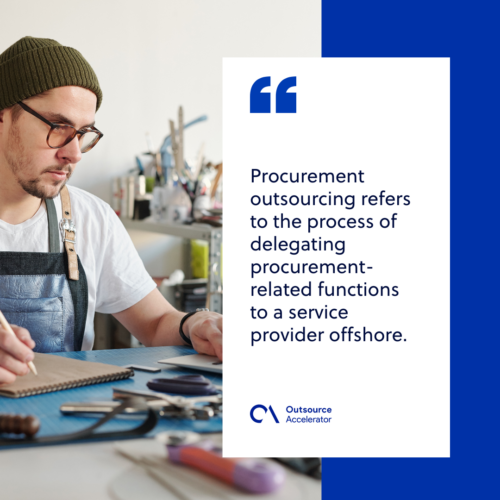Everything you need to know about procurement outsourcing

Nowadays, global companies become competent when they make their operations more efficient.
E-commerce stores and product-based businesses mostly leverage their strengths by delegating some of the complex work to service providers.
Procurement is the key to the success of manufacturers and e-commerce businesses around today. Creating a product is never easy with the materials and equipment needed to manufacture one.
Handling procurement in-house, meanwhile, won’t always solve the problems in sourcing materials.
Small and large companies prefer procurement outsourcing for the convenience and expertise they can get out of their teams. Learn how this helps businesses maintain their operations in this article.
What is procurement outsourcing?
Procurement outsourcing refers to the process of delegating procurement-related functions to a service provider offshore. The third-party vendor will be responsible for either the entire process or a portion of it, from sourcing goods to supplier management.
Product-based companies rely on procurement the most. With the towering costs and limited resources in a local area, they have to find the most cost-efficient way to create their products.
Startups, meanwhile, don’t have enough knowledge and expertise to manage procurement at first.
Procurement outsourcing fills the gap in terms of process management and expertise. This can be offered by business process outsourcing companies and specialized procurement outsourcing providers worldwide.
In turn, procurement outsourcing services may fall into three categories:
- Transactional services. This category covers various day-to-day operations in procurement, such as supplier management and processing purchase orders.
- Tactical services. It involves functions that affect operational efficiencies in a procurement process. This includes spot buys and support to internal stakeholders.
- Strategic services. This category covers strategic sourcing efforts and end-to-end management for non-core spend.

Types of procurement services to outsource
Companies can delegate two types of procurement outsourcing services:
Direct procurement
Direct procurement deals with the purchase of materials to be used in a company’s core activity.
This includes raw materials to create a product as well as tools and equipment for a certain service. The materials procured directly will eventually reach customers in another form.
For instance, in making appliances, the company procures motors, wires, steel, and other materials to be assembled. The end product will then reach the customers once it is released in stores.
Indirect procurement
Meanwhile, indirect procurement deals with the purchase of items for non-core activities. This includes office supplies, workspaces, and equipment for repairs and maintenance.
Unlike direct procurement, materials purchased using indirect procurement do not affect core business production.
However, indirect expenses are still crucial in keeping the daily operations of the business running efficiently to support production.
Why companies choose procurement outsourcing
Time will come when you cannot always handle procurement in-house. While a small core team can help you establish your processes at first, they would need support in case you expand your offerings.
Small and large companies use procurement outsourcing for the following reasons:
Cost advantages
Sticking to a few available suppliers will only limit your capabilities to create better products in a cost-effective manner.
By outsourcing procurement services, you get to find suppliers offering cheaper yet high-quality alternatives for your materials. This results in better cost reduction measures on your part.
At the same time, some products would require you to get resources from other countries. Procurement outsourcing providers help you connect with more suppliers globally when needed.
Better operational efficiency
Your in-house team won’t have a divided focus on procurement outsourcing.
You can delegate this to a service provider that can concentrate on transacting with your suppliers and buying the materials and tools you need.
Compliance tracking
Oftentimes, you lose track of spending allocation and compliance in a certain project when doing in-house procurement. You could end up spending more on materials that do not fit your standards, sacrificing your product quality in return.
Procurement outsourcing helps companies track and keep their materials at par with their standards. This is crucial, especially when dealing with products following local and international standards.
More chances for innovation
Lastly, procurement outsourcing opens better chances for innovation, specifically in your products and processes. You can access the latest technology used by your procurement team through your service provider.
At the same time, this helps you update your procurement processes according to new regulations and standards set by global institutions.

The procurement outsourcing market
The global procurement outsourcing market was projected to grow to US$7.3 billion in 2021.
With the pandemic accelerating businesses and technologies forward, the industry expects that outsourcing procurement and other services will continue to rise over time.
A lot of procurement outsourcing companies offer comprehensive services to global companies. This includes IBM, Accenture, and other large-scale firms that cater to top businesses.
Despite the benefits of procurement outsourcing services, it also poses several operational risks, including the following:
- Reduced control. Since you’ll share responsibilities with your service providers, your operational control could also be reduced. You could lose track of your daily purchases and spending when you rely solely on your provider.
- Integration of operations. Procurement outsourcing means you and your in-house employees should be in the loop with your outsourced team. This could mean adjustments on your part since you have to be in sync with your service provider.
- Ensuring service continuity. You should ensure continuity of your services, especially during the transition to service providers. Lack of preparation for this could affect the delivery of your products to your customers.
Proper planning and strategizing prevent these risks from happening.
Aside from this, hiring a suitable procurement outsourcing service provider like Catalyst BPX could even improve your company’s performance in terms of offerings and operations.







 Independent
Independent




